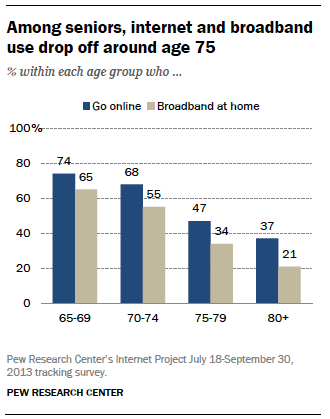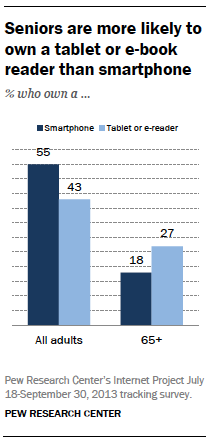Pew Internet Study Finds Older, Poorer And Disabled Seniors Still Not Connected
Senior citizens are traditionally slower to adopt new technologies than younger people, but the ubiquity of the Internet often leaves disconnected seniors without access to government services, health resources, social support, news and information.
The good news, according to the latest study by the Pew Research Internet Project, is that American seniors, defined as adults aged 65 years and older, are catching up with the rest of the population when it comes to being connected to the Internet and having broadband access. The bad news is that the technological divide among senior Americans is growing wider as older, less affluent and disabled citizens are still largely disconnected.

Pew reported on Thursday that six in 10 American seniors now go online and just under half have a broadband connection at home. That rate still trails the rest of America, where about 86 percent of adults use the Internet, but it’s an increase of six percentage points from April 2012.
The rates are especially high among seniors in their late 60s and early 70s, and among wealthy seniors. A full 90 percent of seniors with an annual household income of at least $75,000 use the Internet, which is a higher rate than the general U.S. population.
These numbers drop dramatically among seniors 75 years of age and older. Only 47 percent of Americans ages 75 to 79 go online, and only 34 percent have a broadband connection at home. The numbers fall another 10 percentage points for 80-year-old and older Americans.
The same is true for low-income seniors. Only 39 percent of seniors with an annual household income of $30,000 or less use the Internet, and only 25% of this group have a broadband connection at home. Similarly, seniors without a college degree are significantly less likely to use in the Internet.
In addition to income and education, physical disabilities are another leading obstacle preventing seniors from using the Internet. Pew said that two out of five seniors reported either a health condition that makes reading difficult or a disability that prevents them from participating in daily activities. These seniors, who could benefit greatly from Internet services, are “significantly less likely” to own digital devices, have a broadband connection, or go online at all.
An issue that still faces the majority of older Americans is learning how to use technology. Only 18 percent of seniors said they feel comfortable learning a device on their own, compared with 77 percent that said they would need some help.
Cell phone adoption has increased a full eight percent among seniors, but while more than half of Americans now have smartphones, only 18 percent of seniors have adopted. Interestingly though, more seniors own either a tablets or e-reader than a smarthphone, which is the opposite of the rest of the general public.

Once senior citizens get online, 79 percent agree that people without Internet access are at a real disadvantage in the modern world. Older Americans, especially those with disabilities, could benefit the most from Internet services but are the ones left most in the dark.
© Copyright IBTimes 2024. All rights reserved.






















